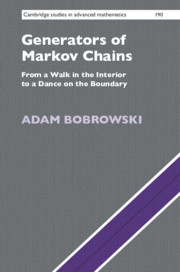
- Cited by 5
-
Cited byCrossref Citations
This Book has been cited by the following publications. This list is generated based on data provided by Crossref.
Bobrowski, Adam and Rudnicki, Ryszard 2020. On convergence and asymptotic behaviour of semigroups of operators. Philosophical Transactions of the Royal Society A: Mathematical, Physical and Engineering Sciences, Vol. 378, Issue. 2185, p. 20190613.
Banasiak, Jacek 2021. Positivity and its Applications. p. 31.
Bobrowski, Adam 2021. Semigroup-theoretic approach to diffusion in thin layers separated by semi-permeable membranes. Journal of Evolution Equations, Vol. 21, Issue. 1, p. 1019.
Bobrowski, Adam 2023. Concatenation of Nonhonest Feller Processes, Exit Laws, and Limit Theorems on Graphs. SIAM Journal on Mathematical Analysis, Vol. 55, Issue. 4, p. 3457.
Bobrowski, Adam 2023. New semigroups from old: An approach to Feller boundary conditions. Discrete and Continuous Dynamical Systems - S, Vol. 0, Issue. 0, p. 0.
- Publisher:
- Cambridge University Press
- Online publication date:
- November 2020
- Print publication year:
- 2020
- Online ISBN:
- 9781108863070




